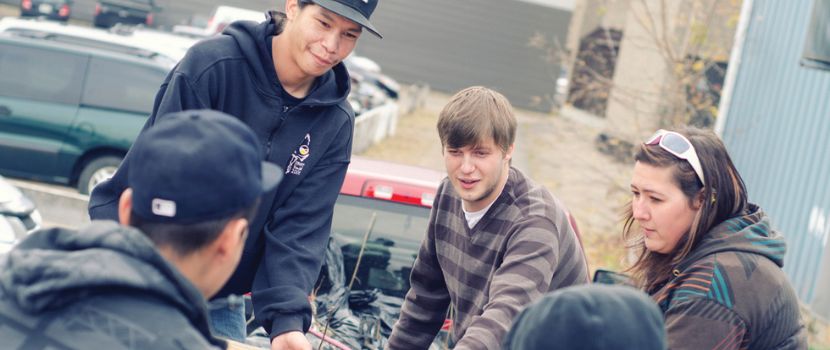
Does a career of working with children and youth at risk interest you? Check out the Child and Youth Care program at Saskatchewan Polytechnic. You’ll find two options: the one-year certificate or the two-year diploma. Whichever you choose, you’ll need a steady personality, strong listening skills, compassion and respect for others.
Start date
Varies
Length
37 weeks
Location(s)
Online/Distance options availableLength and location notes
Some programs offered online or otherwise by distance (i.e., correspondence) include on-site labs, clinicals, practicums or work experiences. They may be offered course-by-course or full-time, or both, and deliveries may change over time.
The one-year Child and Youth Care certificate program is offered part-time through distance education. Graduates of the one-year certificate program are qualified for jobs as youth or family service workers in educational, residential, social services or community-based agencies. Qualified instructors with experience in the field will help you develop the skills you need to build therapeutic relationships with children, youth and families. Your studies will focus on:
- Indigenous awareness;
- addictions and the criminal justice system;
- behavioural intervention strategies and therapeutic activities;
- communication, employability and problem-solving skills;
- crisis prevention/self-protection strategies;
- health and wellness, human growth and development
- Indigenous awareness; and
- planning and implementing activities.
The program combines classroom theory with practical learning. You’ll learn from guest speakers and participate in experiential activities. Two work-based practicums give you an opportunity to work directly with children and youth at risk on a day-to-day basis. You’ll apply core concepts learned in class, develop your skills and engage in the design and delivery of programs.
Youth Care Worker certificate and diploma (previous)
You may contact the student advisors for assistance in making an education plan to complete your program.
- Marilyn Philipchuk at 306-659-4903 or marilyn.philipchuk@saskpolytech.ca
Career and salary information
Your career
When you graduate, look for positions as a youth worker, family support worker, group home staff, community outreach worker or classroom assistant. There are job opportunities in community-based child and youth programs, school-based programs, residential treatment centres, recreation programs, home-based care, child and youth advocacy, and community development.
For more information, contact the Student Employment Services at a campus nearest you.
Potential careers
| Sample job title | NOC classification |
|---|---|
| Youth worker | Social & community service workers (42201) |
| Group home worker | Social & community service workers (42201) |
| Community worker | Social & community service workers (42201) |
Part-time delivery
Admissions
Admission requirements
- Grade 12
- English Language Requirement
Note
- Admitted students will be required to provide evidence of a Criminal Record Check and a Vulnerable Sector Search prior to entering required coursework and practicum with children, youth and adults. At the discretion of the agency, a student may be declined access to a practicum placement based on the contents of the Criminal Record Check, personal interview and/or medical assessment. A student must complete the practicum placements to graduate from the program. The cost of the Criminal Record Check and Vulnerable Sector Search is the student's responsibility.
- Proof of current Standard First Aid and CPR 'C' or equivalent may be required prior to entry into a practicum.
- Accepted international students require a co-op work permit to complete the practicum requirements for this program. This is mandatory. Students who do not have a co-op work permit will not be allowed to participate in their practicums. It is the student's responsibility to ensure they have the required documentation to study in Canada and a co-op work permit to complete the practicum requirements of this program.
Alternative admission
Applicants who do not possess the academic qualifications for a program may be admitted if evidence of probable success can be established through an alternative admission assessment. Applicants are automatically considered for alternative admission. However, some specific admission requirements may still need to be met.
ACCUPLACER©
Refer to the ACCUPLACER© cut scores for this program below, and review additional details concerning Alternative Admission using Accuplacer.
- 250 Arithmetic
- 250 Reading
- 245 Writing
- 4 Writeplacer
Post-secondary
Some programs allow applicants to meet the admission grade level requirement using 15 approved post-secondary credits. Review additional information.
Admission method
First Qualified/First Admitted
The First Qualified/First Admitted (FQFA) process is used for the majority of Saskatchewan Polytechnic programs. When we determine that you meet the program's admission requirements, you will be offered admission based on the date you fully qualify for the program. The earlier you provide the appropriate documents and information that qualify you for admission to the next intake, the earlier you might begin your studies.
Applications for all FQFA programs open September 1 each year.
Sponsored programs or programs targeted to specific groups do not accept applications year round or maintain an application pool.
See Admission Processes for more information about this method of admission.
Tuition and fees
Varies by course.
Courses
Students must be admitted to the program before taking the practicums.
Get credit for what you know
Prior Learning Assessment and Recognition
Saskatchewan Polytechnic recognizes that adults learn in many different ways. This includes acquiring knowledge and skills through life and work experience or non-formal training.
See link(s) below to get more information about PLAR.
Transfer credit
Many Sask Polytech students benefit from transferring course credit. You may be eligible to transfer credit to Sask Polytech or to another college or university.
| Institution | Details |
|---|---|
| Athabasca University | Graduates of this program may receive 30 credit units toward Bachelor of Professional Arts-Human Services (BPA-HRSV). Students are required to present an additional 30 university level credits prior to admittance into the BPA-HSRV program. |
Related programs
Mental Health and Addictions Counselling
Additional information
Have a question about part-time delivery? Email ConEd@saskpolytech.ca or call 306-659-4418.

